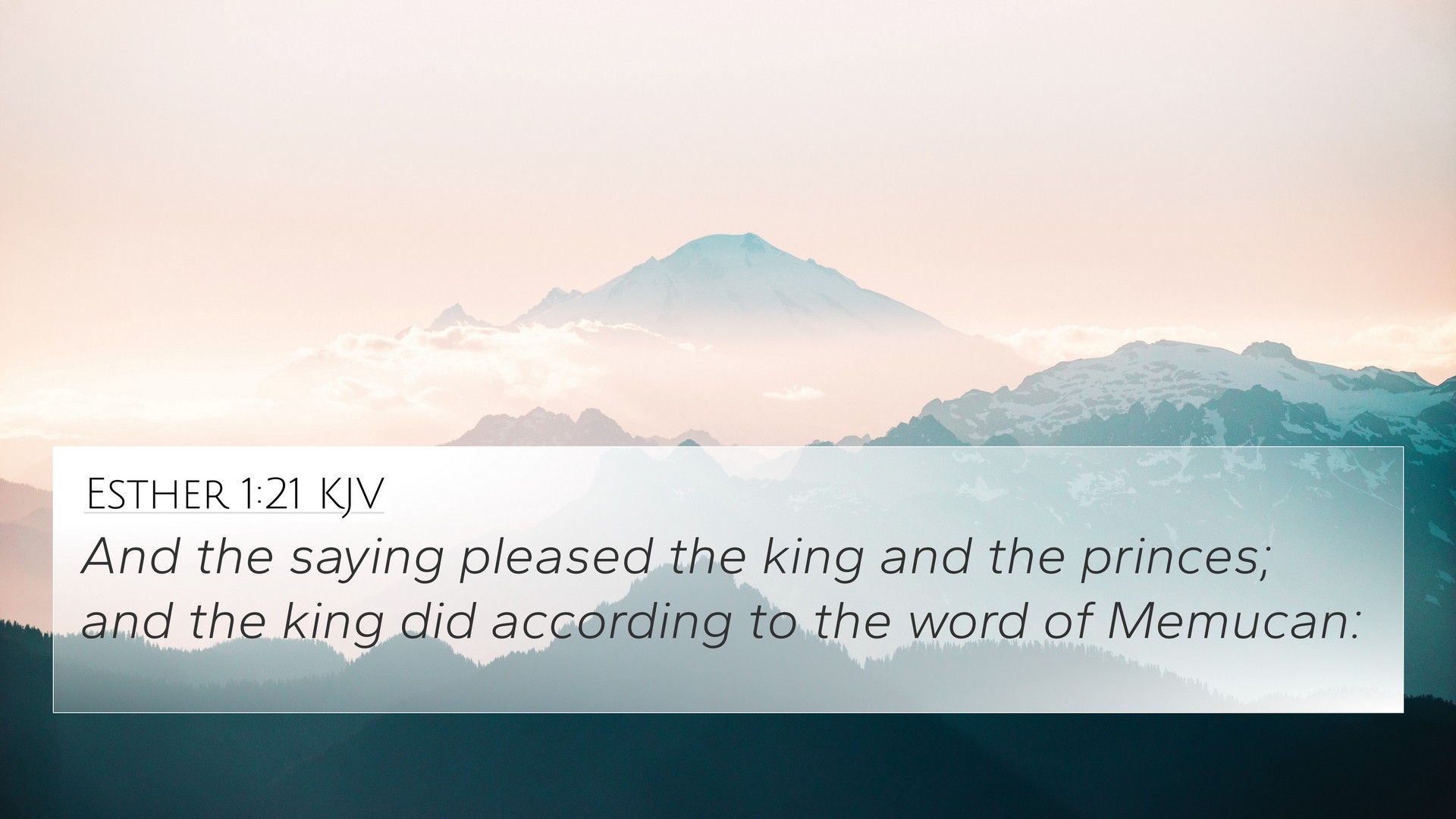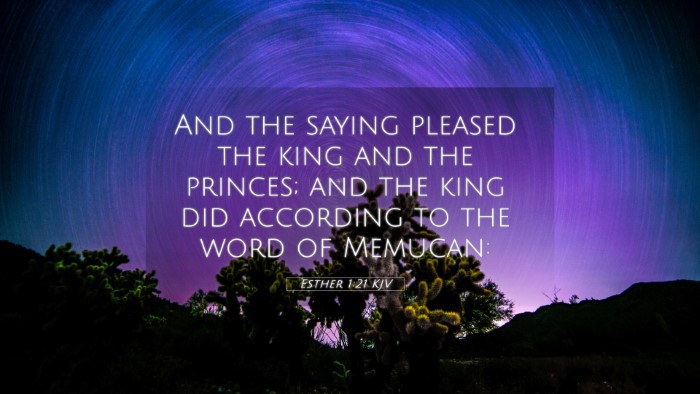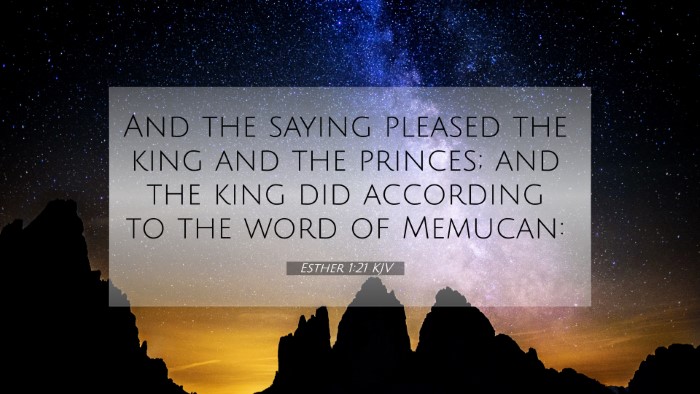Old Testament
Genesis Exodus Leviticus Numbers Deuteronomy Joshua Judges Ruth 1 Samuel 2 Samuel 1 Kings 2 Kings 1 Chronicles 2 Chronicles Ezra Nehemiah Esther Job Psalms Proverbs Ecclesiastes Song of Solomon Isaiah Jeremiah Lamentations Ezekiel Daniel Hosea Joel Amos Obadiah Jonah Micah Nahum Habakkuk Zephaniah Haggai Zechariah MalachiEsther 1:21 Similar Verses
Esther 1:21 Cross References
And the saying pleased the king and the princes; and the king did according to the word of Memucan:
Uncover the Rich Themes and Topics of This Bible Verse
Listed below are the Bible themes associated with Esther 1:21. We invite you to explore each theme to gain deeper insights into the Scriptures.
Esther 1:21 Cross Reference Verses
This section features a detailed cross-reference designed to enrich your understanding of the Scriptures. Below, you will find carefully selected verses that echo the themes and teachings related to Esther 1:21 KJV. Click on any image to explore detailed analyses of related Bible verses and uncover deeper theological insights.

Genesis 41:37 (KJV) »
And the thing was good in the eyes of Pharaoh, and in the eyes of all his servants.

Esther 2:4 (KJV) »
And let the maiden which pleaseth the king be queen instead of Vashti. And the thing pleased the king; and he did so.

Esther 1:19 (KJV) »
If it please the king, let there go a royal commandment from him, and let it be written among the laws of the Persians and the Medes, that it be not altered, That Vashti come no more before king Ahasuerus; and let the king give her royal estate unto another that is better than she.
Esther 1:21 Verse Analysis and Similar Verses
Understanding Esther 1:21
Verse: “And the king’s anger was pacified, and he did according to the word of Memucan.” - Esther 1:21
Summary of the Verse Meaning
Esther 1:21 describes a pivotal moment in the narrative of Queen Vashti's refusal to appear before King Ahasuerus. The verse indicates that after Vashti's dismissal, the king's wrath was calmed by the counsel of Memucan. This shows the influence of advisors in royal decisions and reflects the theme of obedience and the consequences of defiance within the broader narrative.
Commentary Insights
- Matthew Henry: Matthew Henry emphasizes the king's initial wrath and how it was important for him to maintain order in his kingdom. He explains that Memucan’s counsel was a catalyst for the king’s decision-making process, which shows a shift from personal emotion to political strategy.
- Albert Barnes: Albert Barnes notes the significance of the king's pacification and highlights the role of advisors in a monarchy. He interprets the verse as revealing the king’s reliance on advice to navigate through his emotional turbulence, thus reflecting on the importance of wisdom in leadership.
- Adam Clarke: Adam Clarke details the social and cultural implications of the king's actions. He believes this verse not only brings resolution to specific conflict but also sets the stage for future events regarding Esther and the Jewish people, illustrating a divine plan at work behind the scenes.
Cross References and Thematic Connections
Esther 1:21 shares connections with several other passages throughout the Bible. Here are some related verses:
- Proverbs 15:1: “A soft answer turneth away wrath: but grievous words stir up anger.” - This verse relates to the calming of the king's anger through wise counsel.
- Ecclesiastes 8:3: “Be not hasty to go out of his sight: stand not in an evil thing; for he doeth whatsoever pleaseth him.” - Reflecting the respect owed to authority figures.
- Proverbs 11:14: “Where no counsel is, the people fall: but in the multitude of counsellors there is safety.” - Highlighting the importance of wisdom and counsel in decision-making.
- Daniel 1:20: “And in all matters of wisdom and understanding, that the king enquired of them, he found them ten times better than all the magicians and astrologers that were in all his realm.” - Relating to the wisdom offered in royal courts.
- Matthew 10:16: “Behold, I send you forth as sheep in the midst of wolves: be ye therefore wise as serpents, and harmless as doves.” - Illustrating the theme of wisdom in facing challenging situations.
- Romans 13:1: “Let every soul be subject unto the higher powers. For there is no power but of God: the powers that be are ordained of God.” - Reflecting the Biblical principle of submitting to authority.
- Acts 5:29: “Then Peter and the other apostles answered and said, We ought to obey God rather than men.” - The balance between obeying earthly authority and divine commands.
Inter-Biblical Dialogue
This verse also encourages further contemplation through cross-referencing other Biblical texts that engage with its themes:
- Esther 2:1: This follows the aftermath of Vashti’s defiance, emphasizing the consequences of disobedience.
- Proverbs 29:2: “When the righteous are in authority, the people rejoice: but when the wicked beareth rule, the people mourn.” - This articulates the nature of leadership and its effects on society.
- James 1:19: “Wherefore, my beloved brethren, let every man be swift to hear, slow to speak, slow to wrath.” - This ties into the theme of controlling anger and heeding wise counsel.
- 1 Peter 2:13-14: “Submit yourselves to every ordinance of man for the Lord’s sake: whether it be to the king, as supreme; or unto governors, as unto them that are sent by him...” - Reinforcing the principle of submission to authority.
Tools for Bible Cross-Referencing
When studying Esther 1:21, one can benefit from using various tools to engage in cross-referencing:
- Bible Concordance: Look for keywords such as "anger," "counsel," or "king" to find related scriptures.
- Bible Cross-Reference Guide: Many editions of the Bible come with built-in cross-references that can enhance understanding.
- Cross-Reference Bible Study: Use thematic studies focusing on leadership, counsel, and authority across the Scriptures.
Conclusion
Esther 1:21 is a rich verse that serves as a reminder of the significance of wise counsel in moments of anger and decision-making. By examining this verse in conjunction with others, readers can gain a deeper understanding of the dynamics of authority, obedience, and the intersection of human actions with divine sovereignty. Utilizing cross-references and tools for Bible study can lead to a more comprehensive grasp of the scriptures and their interconnections.


